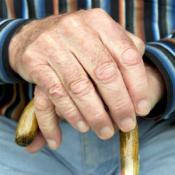 “Go into your grief, for there your soul will grow.” —Carl Jung
“Go into your grief, for there your soul will grow.” —Carl Jung
Grieving is a powerful and personal journey. It is an inevitable part of living. Eventually we all grieve something or someone. If you’ve lost a child or parent, or a friend, lover, or spouse, you know that grief has the power to transform.
We usually live within the illusion that we are in control. That is, we live a certain way until something happens to shatter our perception. The resulting dissolution—or you might say dis-illusion—that follows is actually the beginning of a remarkable process of being healed. It marks the first stage in the grief journey.
Stages of Grief
In 1969, Elisabeth Kübler-Ross, a Swiss American psychiatrist, introduced the “five stages of grief.” Her work with people who had terminal cancer led her to define the five distinct phases a dying person goes through while coming to terms with their fate:
- Denial: Disbelief, shock, and numbness after hearing the “bad” news.
- Anger: When the numbness lifts, anger may be easier to feel than the intense pain associated with what is being lost. This free-flowing anger can be directed inward toward the self or outward toward doctors, nurses, friends, family, spiritual advisors, and/or God.
- Bargaining: For some, bargaining can be a reaction to the vulnerability that occurs when feeling the sorrow of loss. It can be an attempt to feel more in control of a situation where control just isn’t possible. It is characterized by an attempt to seek the impossible; to find a way out.
- Depression: The full impact of the unmasked impending loss of life finally hits, and feelings of sorrow, sadness, and depression follow.
- Acceptance: Coming to terms with what is happening and finding a way forward.
While many have applied these stages to the process of grieving the death of another person, it was not Kübler-Ross’ intention that they be used this way when she created the model. There are other models that are more specific to grieving the loss of a loved one that are used by grief counselors and therapists. While the stages described by these models differ somewhat, like Kübler-Ross’ model they all chronicle a journey-type process that leads to acceptance and the eventual ability to once again move forward.
Acknowledging Brokenness; Being Present
When the shock of sudden loss subsides, the numbness that initially accompanies that shock wears off as well. A pain-filled state ensues when the harsh reality of loss is realized. This early phase of grief is about brokenness. When we experience a loss, the bond that once attached us to the other—whether the other is a person, place, or thing—is severed. When the bond that ties is severed, we feel as though we have been broken. It is a painful and searing state; a state that can’t be rushed.
What a grieving person in this stage needs most is to feel that those they are closest to can accept the pain they are experiencing. Unfortunately, many people are uncomfortable with their thoughts and ideas about endings and death. The feelings that arise with grief are just too much for them. Their attempts, aimed at getting a grieving person to feel better and leave the sorrow behind, only serve to prolong the grief process.
A kind touch and a shared quiet moment that honors the feelings of a grief-stricken friend can be the best offering of condolence. A willingness to simply be present, to witness and accept the raw emotions of grief, is the first step in a transformative and healing process for both the bereaved and those who surround them.
Support Groups
The feelings that come with grief are powerful. Grieving takes time, and often the family and friends of a grief-stricken person are ready to move on long before the grieving one can or wants to. Support groups are a viable option for those who find themselves alone in their grief. Being able to share the experience with others on the same path may be a relief. Since the grieving process is different for everyone, a support group can accommodate these differences. Some studies suggest that men and women grieve differently, with women needing to speak about and share their intense feelings with others while men often deal with their own intense emotions by taking action. In a support group setting, all experiences can be heard, shared, and validated.
Widows and widowers in the gay community often have difficulty finding the support needed while experiencing the grief of bereavement. Even finding a support group can be difficult. Blogger Dan Cano writes poignantly about his experience after finally finding a support group where he could speak freely and be understood:
“I started my lesbian and gay bereavement group a few weeks ago, and every Thursday night we gather to tell our stories. We share of our history with our partners, lovers, husbands and wives. We share the trauma of losing the most central person in our lives. We tell of our difficult goodbyes, and of the daily anguish that we must now endure. We talk about being left behind, of feeling lost, of struggling with a new identity. We talk of people’s well intended, but missing the mark, words. We cry, we laugh, we listen.”
What We Learn from Grief
When we sit in stillness and accept the waves of grief that wash over, eventually there will come a time when the urge to move will stir. It will be quiet, unassuming, and almost imperceptible. From intense feelings over what has been lost there will arise a feeling of gratitude for what is remaining. When experiencing the loss of a loved one, an inevitable gratitude for life and living unfolds. The gift of grief is ultimately a strengthening of the ability to truly appreciate and value the process of being alive.
References:
- Greenspan, Miriam. Healing Though the Dark Emotions: The Wisdom of Grief, Fear & Despair. Shambhala Publications Inc. Boston, Massachusetts, 2003.
- Hanson, Rick, Ph.D. (2007). Grief Recovery: Implication of Neuroscience and Contemplative Wisdom. Retrieved from: http://www.wisebrain.org/KaraSlides.pdf on 21/06/2014.
- Cano, Daniel (2009). Gay Grief. Retrieved from http://daninrealtime.blogspot.ca/2009/11/gay-grief.html on 22/06/2014.

The preceding article was solely written by the author named above. Any views and opinions expressed are not necessarily shared by GoodTherapy.org. Questions or concerns about the preceding article can be directed to the author or posted as a comment below.

 Grief and Chronic Illness: How to Find Acceptance
Grief and Chronic Illness: How to Find Acceptance Moving Forward after the Death of a Child
Moving Forward after the Death of a Child Coping with Grief: Why Forgiveness Matters So Much
Coping with Grief: Why Forgiveness Matters So Much

Please fill out all required fields to submit your message.
Invalid Email Address.
Please confirm that you are human.
Leave a Comment
By commenting you acknowledge acceptance of GoodTherapy.org's Terms and Conditions of Use.